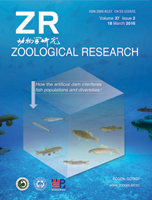
|
Zoological Research
Kunming Institute of Zoology, Chinese Academy of Sciences
ISSN: 2095-8137
Vol. 38, No. 4, 2017, pp. 198-202
|
 Bioline Code: zr17025
Bioline Code: zr17025
Full paper language: English
Document type: Report
Document available free of charge
|
|
|
Zoological Research, Vol. 38, No. 4, 2017, pp. 198-202
| en |
Pseudogenization of the Humanin gene is common in the mitochondrial DNA of many vertebrates
Logan, Ian S.
Abstract
In the human the peptide Humanin is produced from the small Humanin gene which is embedded as a gene-within-a-gene in the 16S ribosomal molecule of the mitochondrial DNA (mtDNA). The peptide itself appears to be significant in the prevention of cell death in many tissues and improve cognition in animal models. By using simple data mining techniques, it is possible to show that 99.4% of the human Humanin sequences in the GenBank database are unaffected by mutations. However, in other vertebrates, pseudogenization of the Humanin gene is a common feature; occurring apparently randomly in some species and not others. The persistence, or loss, of a functional Humanin gene may be an important factor in laboratory animals, especially if they are being used as animal models in studies of Alzheimer's disease (AD). The exact reason why Humanin underwent pseudogenization in some vertebrate species during their evolution remains to be determined. This study was originally planned to review the available information about Humanin and it was a surprise to be able to show that pseudogenization has occurred in a gene in the mtDNA and is not restricted solely to chromosomal genes.
Keywords
mtDNA; Humanin; Pseudogenization; NUMT
|
| |
© Copyright 2017 - Zoological Research
Alternative site location: http://www.zoores.ac.cn/
|
|
